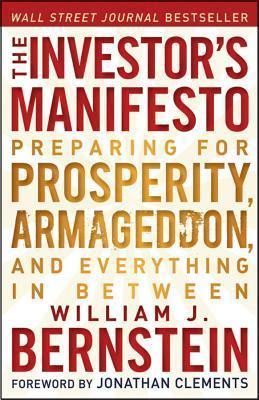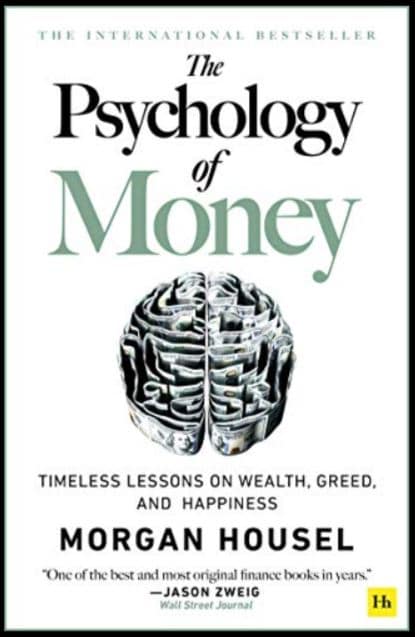The Investor’s Manifesto – Preparing for Prosperity, Armageddon and Everything In Between by William J. Bernstein
Manifesto was written right in the thick of the “Great Recession.” Just over 200 pages, it’s clearly written and accessible no matter your investing experience. I’ve summarized a few key lessons below, but I’ll start with a one-sentence summary: It’s never a matter of if the market will crash, it’s only a matter of when.
As we approach the ten-year anniversary of the last major stock market correction, I’ve revisited the books that I purchased in its immediate aftermath. Favorites like Bernstein’s Manifesto provided important historical context for the first real market crash of my career and helped frame what it meant for investors, my clients, and career! Naturally, it underscored the importance of taking the long view, reminds us exactly what we’re signing up for when we buy stock, and how to avoid becoming our own worst enemies. Today – nearly a full decade removed from Dow 6,500 – revisiting the lessons covered by The Investor’s Manifesto helps prepare us for the next big correction when it arrives.
Bernstein provides vivid descriptions of pivotal events throughout financial history, like the origin of loan and stock capital and the evolution of trading. He gets granular explaining financial terminology and the calculus behind them, and best practices with regard to the investing choices before us, all in service of the overarching themes and principles he hopes will stick with readers. Among the following are Bernstein’s most compelling and memorable passages:
The Nature of the Beast
“The relationship between risk and return is the single most important concept in this book”
“If you want high stock returns, you are going to pay for them by bearing risk; this is a polite way of saying… your portfolio is going to lose a truckload of money from time to time.”
“Diversification among different stock asset classes works well over years and decades, but often quite poorly over weeks and months.”
“The [higher returns] of equity ownership are paid in the universal currencies of financial risk: stomach acid and sleepless nights”
“One of the dumbest things any investor can do is own stock in the company he or she works for, since he or she can lose both a job and portfolio simultaneously.”
“When it comes to [active] fund managers and market strategists, this year’s hero usually turns into next year’s zero.”
“Performance comes and goes, but for active mutual fund managers and their clients, expenses are forever.”
The Nature of the Portfolio
“A balanced portfolio consists of significant allocations to both stock and bonds. This minimizes your chances of dying poor. Investing too much in risky assets could have dire consequences in the event of a long lasting market failure, but so does investing too much in safe assets that fail to grow your portfolio enough to sustain your retirement needs.”
“The overall split between stock and bond in your retirement portfolio depends primarily upon your age and tolerance for risk.”
The Enemy in the Mirror
“Our emotions define our humanity, what binds us to our family, friends, and neighbors. Without them we are soulless, heartless automatons, devoid of meaning or purpose. But in the world finance, they are death itself.”
“Keep yourself in emotional shape by regularly rebalancing your portfolio, since this forces you to move in the direction opposite that of the crowd.”
“In the investment world you are not above average. You are likely not even close. Finance attracts the best and brightest in our society, then gives them the best data and fastest computers…. Your odds of succeeding in this game are about the same as your chances of starting at third base for the Yankees next season.”
“Do not crave fancy investment vehicles; most will leave a sour taste. Plain-vanilla index funds will better nourish your retirement.”
Muggers and Worse
“Unlike your doctor, lawyer, or accountant, your broker is not a fiduciary: that is he is under no legal obligation to place your interests above his own”
“Both mutual fund companies and brokerage houses know more ways than you can count of fleecing you with or without you knowing.”
Building your Portfolio
“[A diversified portfolio] inevitably will contain poorly performing asset classes – there will always be at least one – but it’s identity will change from year to year. It is the overall return of the portfolio that counts.”
“No matter how you allocate your assets, you will always wish that you had assigned more to the best performers and nothing to the worst performer. Since no one can predict which of these will be, the safest course is to own them all, and thereby, as best you can, assure yourself of not being devastated by an Enron or a Lehman.”
“When you minimize your expenses and diversify, you forego bragging rights with neighbors and in-laws, but you will also minimize the chances of impoverishing yourself and the ones you love.”
“Most retirees should purchase “longevity insurance” by postponing Social Security until age 70 and perhaps by adding a commercial immediate annuity as well”
The Nature of the Game
“[The pension system which delivered a dignified retirement to generations of workers] has been replaced with an investment mess of pottage: poorly designed, overly expensive, and thus miserably performing defined contribution plans.”
“Worse, the average American is assumed to somehow possess the expertise and, more importantly, the emotional discipline to execute a competent lifetime investment plan, a goal that even Wall Street professionals fall well short of.”
“If you … make all the classic investment mistakes – ignoring expenses, chasing hot asset classes and managers, overestimating your risk tolerance, and being overly swayed by your family, friends, neighbors and news- you will almost certainly join the millions of Americans doomed to a quiet life of retirement desperation.”
“You should live as modestly as you can and save as much as you can for as long as you can. Saving too much is not nearly as harmful as saving too little.”

